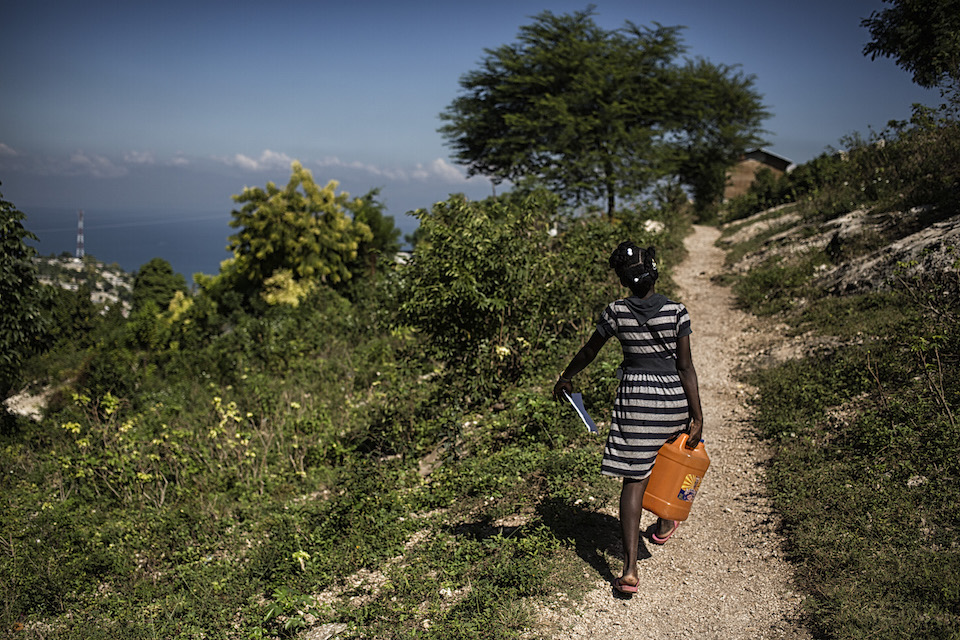"The United Nations’ relationship with Haiti has changed but our commitment has not."
Statement by Stephen Hickey, Political Counsellor at the Permanent Mission of the United Kingdom to the United Nations, at the Security Council meeting on the situation concerning Haiti.

Thank you Mr President and thank you Special Representative Honoré for your briefing this morning. I’d like to pay tribute to you and the important work you’ve done during your time in Haiti and it’s particularly encouraging to hear that the transition from MINUSTAH to MINUJUSTH is on track.
It’s important that this continues. A smooth and seamless transition will send a clear signal to the people and Government of Haiti that the United Nations’ relationship with Haiti has changed but our commitment has not.
MINUJUSTH marks a new era in the UN’s support for Haiti. Its three-pronged focus on police, the rule of law, and human rights will help Haiti to address its future opportunities and challenges independently, for the first time in many decades. And the successful delivery of the MINUJUSTH mission will allow it eventually to leave Haiti having laid a framework for security and stability that Haitians can continue themselves to build on.
I know, Mr President, that there is a lot of work ahead, both for Haiti and the UN. I suspect that few of us who recently visited Haiti believe that success is guaranteed. In the weeks following the visit, I’ve come to believe that three fundamental conditions are required to make MINUJUSTH a success.
First, the new mission must be equipped with the tools that are fit for purpose and matched to Haiti’s needs. For example, to further develop the capacity of Haiti’s police, the UN Police commander will need officers with the right technical and language skills to engage meaningfully with their local counterparts.
Another example is the UN Country Team: joint analysis and programming with MINUJUSTH will help ensure it is better placed to support long-term justice reform in Haiti. And, as the Secretary-General’s latest report rightly points out, all of the UN’s tools will need to be more politically acute if they are to catalyse change.
Indeed, UN tools only go so far. The second condition for success is a government that embraces Haiti’s challenges as its own and pro-actively takes on new responsibilities. The gap left by MINUSTAH is not primarily for its successor mission to plug, but for Haiti’s government and institutions to fill.
This means providing Haiti’s police with proper equipment and salaries – and not squandering these scarce resources elsewhere. As the Special Representative has outlined, it means investment in a justice system that protects all Haitians with the rule of law, leaving no space for corruption to flourish and impunity to fester. It means making critical appointments to the Supreme Court and taking urgently needed reforms through parliament. And finally, it means doing much more to tackle the scourge of gender-based violence. All of this requires that the priorities of Haiti’s politicians are aligned with those of Haiti’s people.
The third condition for success is also about taking responsibility. MINUJUSTH – and the whole UN – must continue to win back the trust of Haiti’s people. On our trip to Haiti we heard about two issues that have damaged the UN’s legacy.
One relates to cholera, a tragedy for the Haitian people and an obstacle to the UN turning its own page in Haiti. I am pleased to hear that infection rates are down. Eradication is within grasp, and like the Ambassador from Kazakhstan, I call on donors to do what they can to make this a reality.
The other tragic issue that has damaged the reputation of UN peacekeeping is the shockingly widespread sexual exploitation and abuse carried out by peacekeepers sent by this Council in the past to Haiti. Such crimes have left deep scars across the country. If we are to ask people to trust in peacekeepers and their mission, we cannot allow this to happen again - not in Haiti, not anywhere. We have agreed to a clear framework of action through resolution 2272. There can be space for backsliding on these commitments.
Mr President,
In conclusion, the UK looks forward to a smooth and seamless transition over the next few months. We also hope that these three conditions – a mission equipped with the right tools, a government ready to lead on Haiti’s challenges, and a people ready to trust in the UN again – can accompany the next phase of the UN’s relationship with Haiti.
Thank you.